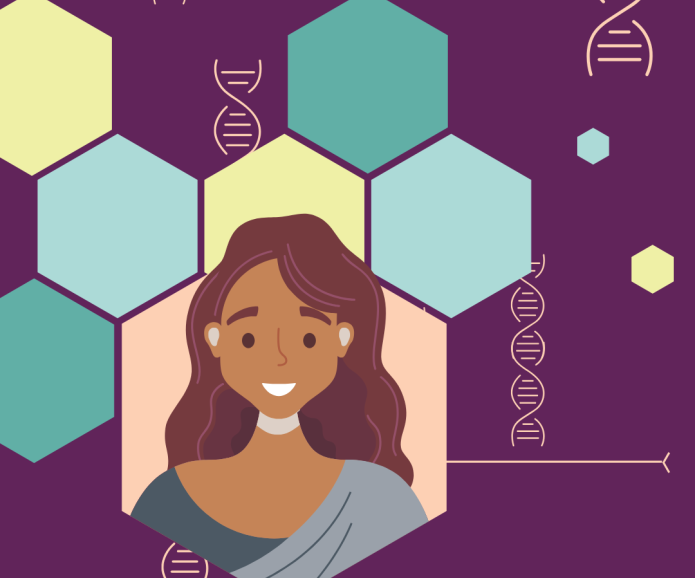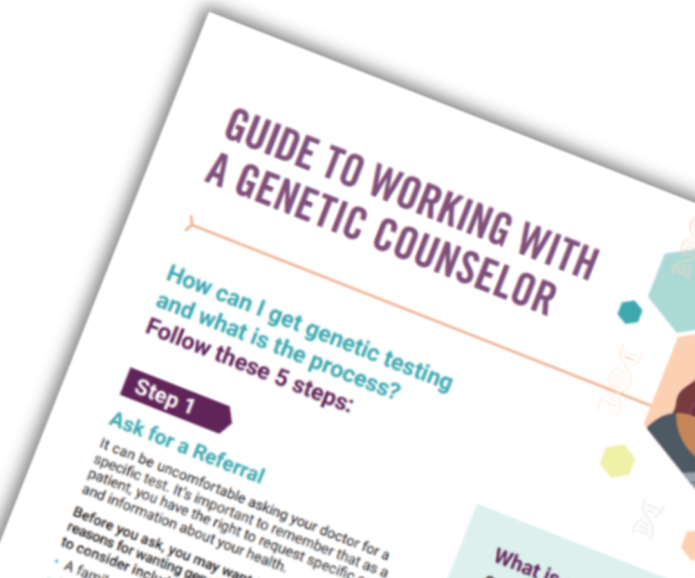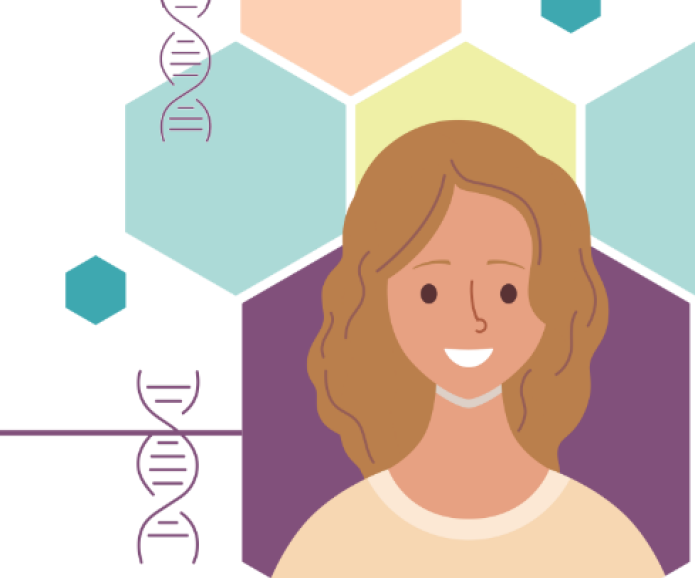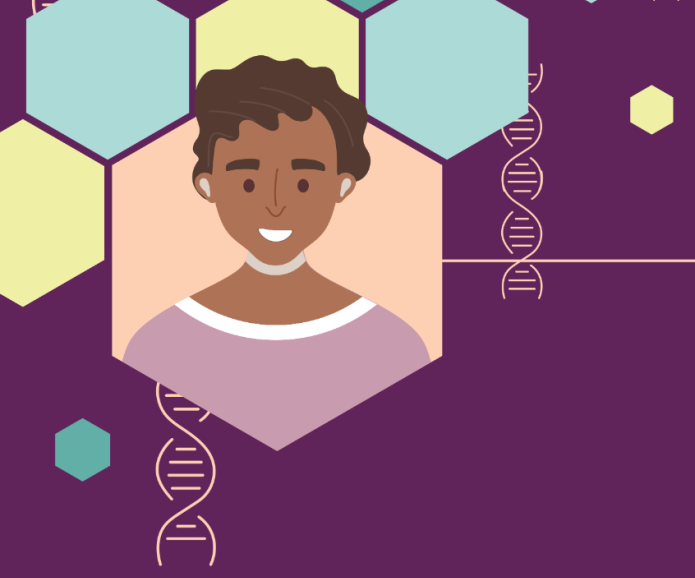


Genetic testing and counseling for kidney disease
Genetic causes of kidney disease are more common than many realize. Genetic testing looks for changes in your DNA that can cause kidney disease. Learn about the benefits of genetic testing for determining the cause of your kidney disease and how genetic tests are performed.

What is genetic testing?
Genetic testing looks for changes (mutations or variants) in your DNA (deoxyribonucleic acid), which is your genetic code. DNA is in every cell in your body. It contains a code with information that builds your body and keeps it working. Your DNA is made up of genes which carry information for unique traits such as the color of your eyes or your blood type, among many other things.
No one's genes are the same, and these differences are known as variations or variants. These variations are why some people have blue eyes and others have brown eyes. Variants can also play a role in the development of diseases, including chronic kidney disease (CKD).
Our genes and variations come from our parents. Half of your genes are passed down from your mom, and the other half from your dad. This is why you might share eye color with one parent but hair color with the other! Variants can also be called mutations.
Genetic testing looks for variants in your:
- Genes, specific pieces of your DNA
- Chromosomes, the structures in your cells that contain your DNA
- Protein levels, which can be a sign of changes in your DNA
Kidney disease can be caused by changes in just one gene, changes in many genes or changes to chromosomes.
1 in 5 cases of kidney disease is linked to a genetic change.

Is genetic testing right for me?
You and your doctor may decide to do genetic testing if:
- You have a family history of kidney disease or kidney failure.
- You developed kidney disease before the age of 50.
- Other kidney disease treatments have not worked well to slow down kidney damage.
- You are a member of a racial or ethnic group in which certain types of genetic kidney diseases are more common. One example is the APOL1 gene variants that can appear in people of African descent.
- Your doctor suspects a genetic disease or change may be the cause of your kidney disease.
The decision to have genetic testing is personal. Your doctor can give you guidance and resources throughout the process, but you have the final say.

How is genetic testing done?
The first step is to talk with your doctor about genetic testing. Your doctor can order the genetic test or send you to a genetic counselor. Usually, in genetic testing:
- You give a sample of any of these:
- Blood
- Saliva (spit)
- Cheek swab, which uses a cotton swab to collect a sample of cells from the inside of your cheek
- Your sample is sent to a lab so it can be studied for specific changes in genes, DNA, chromosomes, or proteins that may be the cause of your kidney disease.
- The lab sends the test results in writing to you or your doctor, this may take a few days to a few weeks.
- You will review your results with your doctor and/or a genetic counselor.

What are the benefits of genetic testing?
Up to 3 in 20 people with chronic kidney disease do not know the cause of their disease. And some people may be diagnosed with the wrong cause of their disease. Knowing the cause of your kidney disease can help you and your health care team create a personalized plan to help you manage your disease.
Many kidney diseases have a genetic cause, spanning from more common conditions like polycystic kidney disease (PKD) to more rare disorders such as Fabry disease. Identifying if there is a genetic cause is crucial as it helps to provide a more accurate diagnosis, ensuring that the treatment you receive is tailored to your specific condition. In addition, this can help you understand the progression of your disease over time. For example, some forms of kidney disease can get worse quickly and lead to kidney failure and some affect your kidneys at a slower pace. This will help you prepare for treatment options for your disease.
Genetic testing can also help you understand a family history of kidney disease. Half of your genes came from your mother, and the other half from your father and it is possible they passed down a gene variant that causes kidney disease. Genetic tests can give providers more information on how the disease can be inherited or passed down from one generation to the next. Many patients find this information helpful, especially for family planning.
Genetic testing could also help you see if you are eligible for a clinical trial. Clinical trials are research studies that study the effectiveness of new treatments. Clinical trials may help you learn more about your disease and gain access to new and possibly effective treatments or medicine available only to those participating in the trial.
Genetic testing is a useful tool in understanding why you have kidney disease, and it can guide providers in their treatment decisions.

What are the different types of genetic tests?
There are many kinds of genetic tests, but there is no test that can detect all genetic conditions. Your doctor will choose the test or tests that are right for you. If you have questions about why they chose a test or about another kind of genetic testing, work with your provider to understand their decision.
These are a few types of genetic testing:
- Single gene tests look for any changes in one gene. Your doctor may use this test to confirm or rule out a specific cause of kidney disease.
- Targeted single variant tests look for a specific change in one gene that is known to cause disease. Your doctor may use this to test your family members if they are looking for a specific kind of kidney disease.
- Gene panel tests look for changes in many genes. Your doctor may use this test if they think you have a type of kidney disease caused by changes in multiple genes or if your symptoms match multiple kinds of genetic kidney disease.
- Large-scale genetic tests look at all the genes in your DNA (whole exome) or all your DNA (whole genome). Your doctor may use this test if single gene or panel gene tests did not find a DNA change or they are unsure what caused your kidney disease.
- Chromosomal tests look at whole chromosomes or long strands of DNA to find changes like extra or missing chromosomes or rearranged chromosomes. Your doctor may use this test if they believe that your disease is associated with chromosomal changes.
- Biochemical tests look at the amount of proteins or protein levels in your blood (genes tell your cells to make proteins). If levels of proteins are unusual, this can signal to your doctor that a change in DNA is causing disease.
There are some genetic tests you can buy yourself to test for certain conditions. Not all these tests are the same quality, and it is important to use your best judgement when ordering or taking a test you purchased yourself. These tests are not a diagnosis, and you should discuss any results with your health care provider.

What is a genetic counselor?
Genetic counselors are certified health care professionals with special training in genetics and counseling. You can meet with them before and/or after genetic testing to better understand available genetic testing options and genetic test results.
A genetic counselor can:
- Decide if genetic testing might be right for you
- Choose the right kind of genetic test
- Understand your genetic test results and treatment options
- Understand what your results may mean for your family
- Deal with emotions during the testing process
- Refer you to other doctors, support groups or clinical trials
- If you are interested in finding a genetic counselor, you can use the National Society of Genetic Counselors directory.

What happens during genetic counseling?
The first session usually lasts 45 minutes to 90 minutes. The session can be in a doctor's office, hospital, genetics center or via telehealth (meeting through phones or video). You can attend by yourself, or you can bring someone with you. This may be helpful as they can listen, take notes, and ask questions.
Before genetic testing, the genetic counselor will:
Ask you about your and your family's health history, particularly about kidney disease
Look at your medical records
Look at results from any tests you have had, such as blood and imaging tests
Talk about your genetic testing options, including costs, the testing process, benefits, and limits of the test
If you do not want to proceed with testing, you can let the counselor know at any time. The choice is always up to you.
After receiving your test results, the genetic counselor will:
- Look at and explain your genetic test results
- Explain how gene changes could or could not cause your kidney disease
- Explain what your results may mean for your family
- Tell you the chances of passing a genetic change to your biological children
- Talk about what to do next, such as your treatment options, joining a clinical trial, having follow-up tests, or finding a support group
A genetic counselor will help you decide what is right for you– they should not tell you what to do. They are here to guide you through the process, help you understand the results of genetic testing, and understand the steps to take after getting your results.
Learn more about genetic counselors and their role at the National Society of Genetic Counselors.

What do the results of genetic tests mean?
Genetic test results tell you if you do or do not have genetic changes. The results include:
- Positive, which means the test found a genetic change known to cause kidney disease.
- Negative, which means the test did not find any of the genetic changes you were tested for. If you were not tested for all known genetic changes that cause kidney disease, you may need to have other genetic tests.
- Uncertain, which means that the test found some genetic changes, but it's unknown at this time if those changes may or may not explain or cause kidney disease.
- The results of genetic testing are not absolute. A positive result means that a genetic change linked to CKD has been found, it does not mean that you will definitely develop kidney disease. Similarly, a negative result does not guarantee you will never develop kidney disease. CKD can be caused by other health problems, including high blood pressure and diabetes. Your genetic counselor will help explain what your results mean and any steps you should consider taking.
The results of genetic testing can:
- Help you and your doctor make treatment decisions
- Give more information about how quickly your kidney disease may worsen so you can plan for future treatment
- Help inform decisions about a kidney transplant
Research on genes linked to kidney disease is advancing quickly. Researchers may find new genes linked to kidney disease over time, so talk with your doctor about new genetic tests that are available, even if you have had genetic testing in the past.

What if my doctor does not offer genetic testing?
Genetic testing can answer questions you may have about your kidney disease, especially if you do not know the cause or have a family history of CKD. If your healthcare provider has not mentioned genetic testing, you can ask them if it is a good option for you.
Another option is to get genetic testing directly from a testing company instead of through your doctor. You will still need a doctor to sign off on these tests (similar to a prescription). Some people also choose to do this if their insurance does not cover the cost of genetic testing. You can order genetic tests from these companies, and they may also offer genetic counseling:
- Natera Renasight™ is a gene panel test that tests 385 genes associated with chronic kidney disease. It uses blood or saliva.
- Invitae Renal Disease Program offers over ten different kinds of genetic tests for rare kidney diseases, as well as tests for individual genes.
You can also ask your doctor if there are any clinical trials you could join that include genetic testing.

Guide to Working with a Genetic Counselor
Genetic testing can not only help you understand how your DNA might impact your kidney health, but it can also help determine a more personalized treatment plan and let you know if your family members are at risk for kidney disease. Our guide answers questions you may have about genetic testing, working with genetic counselors, and more.

Can the results of my genetic tests be used against me?
Genetic discrimination is when an employer or insurance company treats you differently because you have a genetic change that causes or raises your chance of a disease. While there are laws to protect you against genetic discrimination, they do not extend to all types of insurance.
The federal Genetic Information Nondiscrimination Act (GINA):
- Makes it illegal for health insurance companies to discriminate based on genetic test results, so they cannot deny you coverage or charge you more. It also denies health insurance companies the ability to ask you or your family members to undergo genetic tests.
- Makes it illegal for employers to discriminate based on genetic test results, so they cannot use results to make decisions about hiring or promoting you. But GINA does not apply to employers with less than 15 employees.
Federal laws do not protect against genetic discrimination from other types of insurance, such as life insurance, disability insurance or long-term care insurance. This means that these insurers may be able to raise prices, reject applicants, and exclude people from obtaining coverage. Some states have laws that may protect against genetic discrimination from these other types of insurance.

How much does genetic testing cost and does health insurance cover it?
The cost of genetic testing can range from less than $100 to well over $2,000, depending on the type of genetic test. Many health insurance plans cover (pay for) the whole cost or part of the cost of genetic testing when your doctor recommends it.
Before you have genetic testing, call your insurance company to ask about costs. You can start by asking these questions:
- Does my plan cover treatment for kidney disease or kidney failure, genetic testing and counseling or other services you need?
- If yes, what services are covered? What services are not covered?
- What are the costs for my plan, such as my:
- Deductible? This is the amount you pay before insurance starts paying the costs.
- Copay? This is the amount you pay each time you get a health care service, such as a doctor's visit or filling a prescription.
- Out-of-pocket maximum? This is the most you will pay for covered services for the year. After you pay this amount, your insurance company will pay all of the costs of covered services.
- Do I need a referral to see a specialist? A referral is permission from your primary care doctor or insurance plan to visit another doctor.
- Do I need prior authorization before getting certain health care services? Prior authorization is permission from your insurance company before you get certain health care services, such as treatments or medical equipment. If you do not get permission before the services, your insurance may not cover the costs. It is also called preauthorization or prior approval.
A genetic counselor or social worker can talk with you about costs and insurance. They may know of programs that cover the cost of genetic testing if your insurance will not pay for it or you do not have insurance. Some genetic testing companies may offer financial assistance programs.

Frequently asked questions about genetic testing
- What kidney diseases are genetic?
- There are more than 60 genetic diseases that are known to affect the kidneys. Some are common while some are rare. Some of these diseases include:
- If I have a genetic disease, will my children have it too?
- You pass down half of your genes to your children, so it is possible that they will inherit your genetic disease. However, genetics are complicated by the input of the other parents' genes, and outside factors. A genetic counselor will help you understand the risk to your children and answer any other questions you may have.
- If my genetic test is negative for changes that cause kidney disease, will I not get CKD?
- No. Chronic kidney disease is caused by many things, such as diabetes and high blood pressure. It is still possible to get CKD even if a genetic test shows no changes that are associated with kidney disease.
- Can I be the first person in my family to have a genetic kidney disease?
- Yes. Changes to genes can happen spontaneously, and some of these changes can cause kidney disease. Even if you do not have a family history of kidney disease, you may still have a genetic cause.


